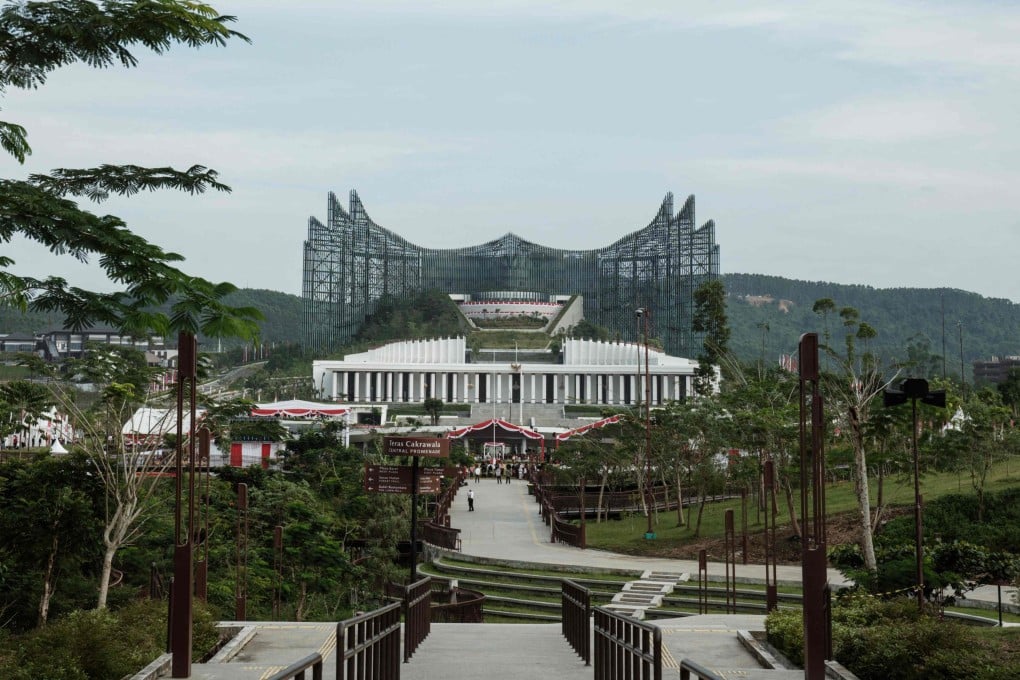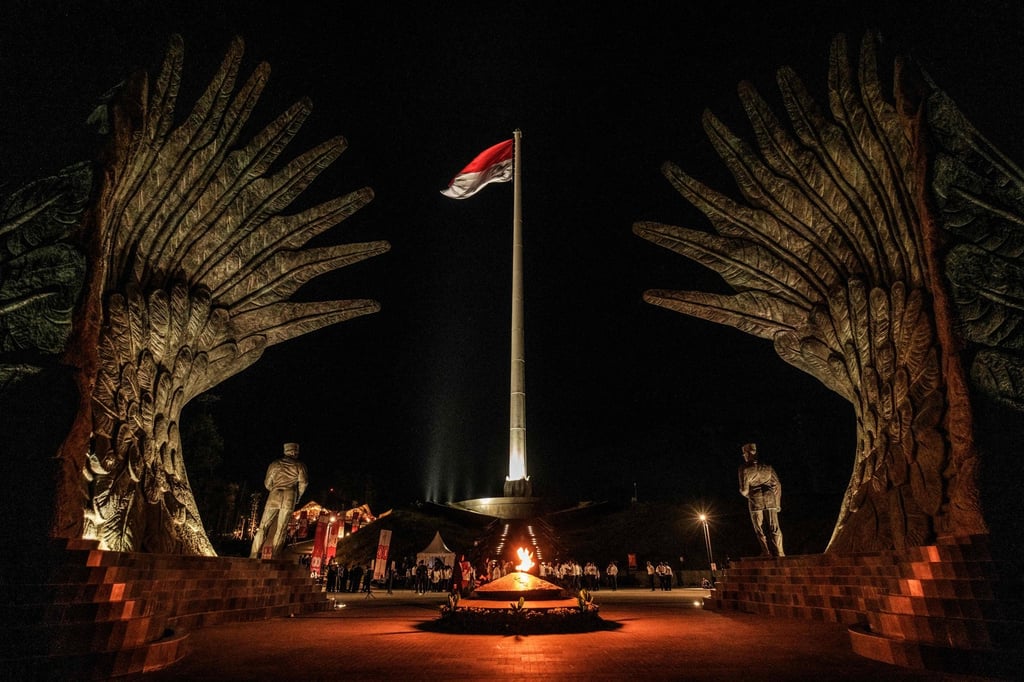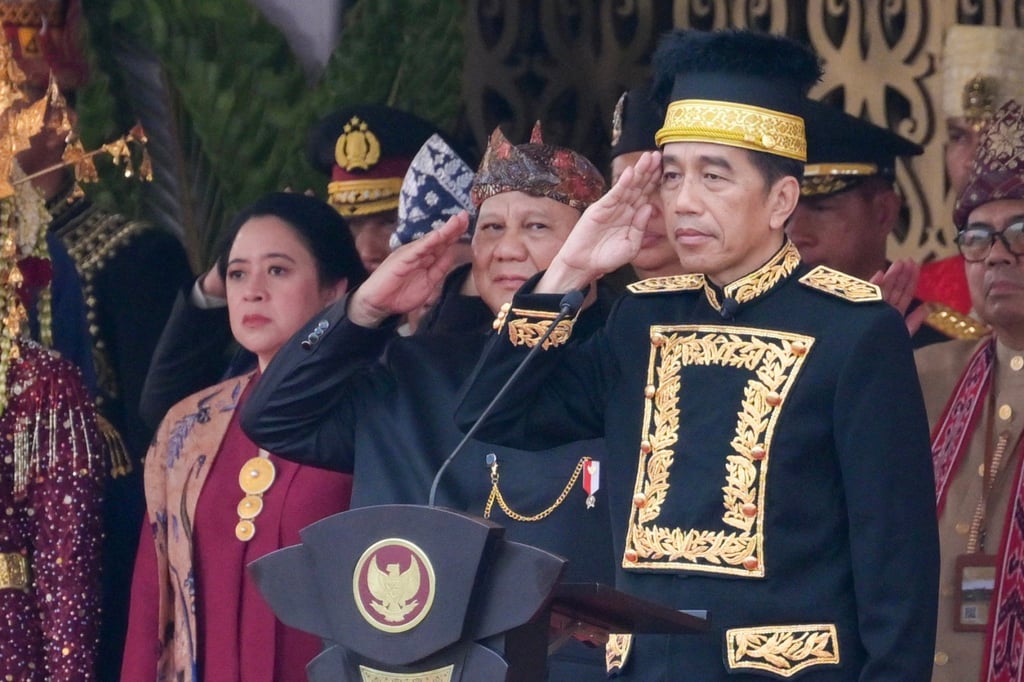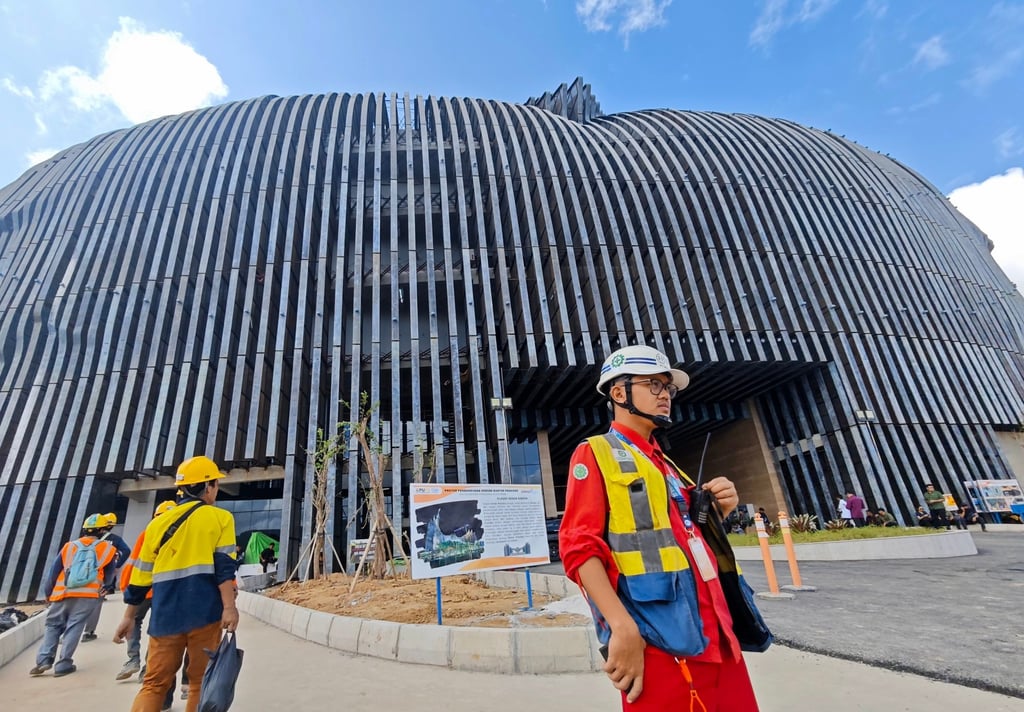
Prabowo’s silence deepens doubts over Indonesia’s dream capital of Nusantara

Resty Woro Yuniar
Published: 10:30am, 23 Aug 2025Updated: 8:49am, 24 Aug 2025
Nusantara was meant to embody Indonesia’s future: a green, modern capital rising from Borneo’s forests. But amid funding cuts and political indifference, the US$28.6 billion project risks becoming a costly monument to unfinished ambition.
The eventual plan? Moving the seat of government there from Jakarta. But this is now clouded by uncertainty after President Prabowo Subianto made no meaningful mention of the city in recent speeches.
Officials insist the project remains on track, but analysts argue that Prabowo’s silence, combined with a sharp cut in funding, signals the project may be shelved or substantially slowed as his administration pivots towards expensive populist programmes.
The new capital was the signature project of former president Joko Widodo, who unveiled the idea in a state of the nation address in 2019. He envisioned a “smart forest city” carved out of the Bornean jungle: environmentally sustainable and designed to spread wealth more evenly across the archipelago, instead of all economic activity being heavily concentrated on Java.
Fears of black magic envelop Indonesia’s new capital Nusantara
Nusantara was intended to replace congested, flood-prone Jakarta, a city of 10 million that is slowly sinking under its own weight.
But six years on, Widodo’s successor has mentioned Nusantara only once – fleetingly – during his own state address to the People’s Consultative Assembly on August 15.
“Jokowi has pioneered the development of Indonesia’s new capital,” Prabowo said, using his predecessor’s nickname while listing his achievements. Hours later, in his draft budget speech to parliament, he omitted the project altogether.
Finance Minister Sri Mulyani later confirmed that Nusantara would receive 6.5 trillion rupiah (US$400 million) from the state budget in 2026 – half the funding allocated this year.
In January, Prabowo had pledged to spend 48.8 trillion rupiah on the project through 2029.
But six years on, Widodo’s successor has mentioned Nusantara only once – fleetingly – during his own state address to the People’s Consultative Assembly on August 15.
“Jokowi has pioneered the development of Indonesia’s new capital,” Prabowo said, using his predecessor’s nickname while listing his achievements. Hours later, in his draft budget speech to parliament, he omitted the project altogether.
Finance Minister Sri Mulyani later confirmed that Nusantara would receive 6.5 trillion rupiah (US$400 million) from the state budget in 2026 – half the funding allocated this year.
In January, Prabowo had pledged to spend 48.8 trillion rupiah on the project through 2029.
‘What will happen to it?’
Prabowo’s lack of focus on Nusantara has left the project’s future in limbo, analysts say.
“Since the beginning, Prabowo has shown no desire to continue the new capital project,” said Yusuf Wibisono, director of the Institute for Demographic and Poverty Studies think tank in Jakarta.
“It’s clear that he has his own development and governance priorities, from the free meals programme, the red and white village co-operatives programme, [free] public schools, and so on. This raises a big question: if the new capital is not continued, what will happen to it?”
Lili Romli, a senior researcher at the National Research and Innovation Agency, said that Prabowo’s omission of Nusantara could be read in two ways.
“First, the construction and the relocation of the capital city will continue, but will be done step by step, not rushed,” he told This Week in Asia. “Second, the construction could be postponed due to financial constraints, diverted to other priority programmes.”

Indonesia’s national flag flutters in Nusantara on August 16, the eve of the country’s Independence Day. Photo: AFP
Prabowo has earmarked 335 trillion rupiah (US$20.5 billion) next year for his free nutritious meals programme, which aims to reach more than 82 million children, toddlers and pregnant women. Nusantara’s budget appears miniscule by comparison.
Budgetary limits aside, the new capital faces other difficulties – from an absence of private investment to reports of prostitution, gambling and even “dark magic” in the area.
Prabowo has chaired only two cabinet meetings that specifically mentioned the project since taking office last October, according to a report earlier this month by Tempo magazine, compared with Widodo’s near-weekly deliberations during his second term.
Still, ministers deny the project has been abandoned. The project “will continue”, State Secretary Minister Prasetyo Hadi told reporters on August 16.
He added that Prabowo had instructed Basuki Hadimuljono, head of the Nusantara Authority, to complete essential government buildings “within three years”.
Construction of the legislative and judicial complexes is due to begin in “late October or early November” of this year, according to Basuki.
Completion of these buildings “is an absolute requirement so that the process of moving the capital from Jakarta to the new capital can proceed according to plan”, Prasetyo said.
Prabowo has earmarked 335 trillion rupiah (US$20.5 billion) next year for his free nutritious meals programme, which aims to reach more than 82 million children, toddlers and pregnant women. Nusantara’s budget appears miniscule by comparison.
Budgetary limits aside, the new capital faces other difficulties – from an absence of private investment to reports of prostitution, gambling and even “dark magic” in the area.
Prabowo has chaired only two cabinet meetings that specifically mentioned the project since taking office last October, according to a report earlier this month by Tempo magazine, compared with Widodo’s near-weekly deliberations during his second term.
Still, ministers deny the project has been abandoned. The project “will continue”, State Secretary Minister Prasetyo Hadi told reporters on August 16.
He added that Prabowo had instructed Basuki Hadimuljono, head of the Nusantara Authority, to complete essential government buildings “within three years”.
Construction of the legislative and judicial complexes is due to begin in “late October or early November” of this year, according to Basuki.
Completion of these buildings “is an absolute requirement so that the process of moving the capital from Jakarta to the new capital can proceed according to plan”, Prasetyo said.

Widodo (right) and Prabowo (centre) salute during a flag-raising ceremony for the 79th Independence Day celebrations in Nusantara last year. Photo: AFP
But doubts persist even within the ruling coalition. Bambang Haryo Soekartono, a lawmaker and senior member of Prabowo’s Gerindra party, has urged the government to “immediately evaluate” progress.
Saan Mustopa, vice-chair of the National Democratic Party, has suggested Nusantara should instead serve as the provincial capital of East Kalimantan, “to end the controversy surrounding its status and ensure existing infrastructure is not abandoned”.
Basuki warned last month that maintaining the existing buildings alone would cost 300 billion rupiah (US$18.4 million) annually.
But doubts persist even within the ruling coalition. Bambang Haryo Soekartono, a lawmaker and senior member of Prabowo’s Gerindra party, has urged the government to “immediately evaluate” progress.
Saan Mustopa, vice-chair of the National Democratic Party, has suggested Nusantara should instead serve as the provincial capital of East Kalimantan, “to end the controversy surrounding its status and ensure existing infrastructure is not abandoned”.
Basuki warned last month that maintaining the existing buildings alone would cost 300 billion rupiah (US$18.4 million) annually.
In the first two years since construction began in 2022, the government spent 75.8 trillion rupiah on the project. Widodo had hoped private investors would cover 80 per cent of its estimated 466 trillion rupiah cost.
Sunk cost
The Nusantara Authority said in April that it had secured a little over 62 trillion rupiah in commitments from 42 companies, mostly Indonesian, with foreign investors from the UAE, South Korea, the United States and China also pledging to participate.
By May, it reported 36 letters of intent from Chinese firms worth around 70 trillion rupiah, spanning sectors from energy to waste management and transport.

Workers at a construction site in Nusantara in last July. Questions about Nusantara’s future have swirled within Prabowo ruling coalition. Photo: EPA-EFE
Analysts have expressed scepticism about how many of these pledges will materialise, however.
“Some who have invested in Nusantara have a close relationship or a debt of gratitude with the government and Jokowi specifically,” said Yusuf of the Institute for Demographic and Poverty Studies.
“I’m convinced they’re not serious about investing. The new capital city doesn’t have a population yet. The only people there are workers. So how can there be investment?”
Deni Friawan, an economic researcher at the Centre for Strategic and International Studies (CSIS) Indonesia think tank, described Nusantara as a “sunk cost”.
“Don’t assume it’s a shame to discontinue it, just because the costs already incurred are so substantial,” he said.
“The project should be postponed. If it continues, the costs will be enormous.”
Even if work was halted, Yose Rizal Damuri, executive director of CSIS, said accountability must still be ensured.
For now, the grand promise of a new capital for Indonesia remains just that – a promise. In the end, Nusantara may not serve a testament to the Southeast Asian nation’s future, but to the power of political change.

Resty Woro Yuniar
Resty Woro Yuniar is a Jakarta-based reporter who covers Indonesian current affairs and Southeast Asia's tech scene. She was previously Indonesia correspondent at the BBC and tech
Analysts have expressed scepticism about how many of these pledges will materialise, however.
“Some who have invested in Nusantara have a close relationship or a debt of gratitude with the government and Jokowi specifically,” said Yusuf of the Institute for Demographic and Poverty Studies.
“I’m convinced they’re not serious about investing. The new capital city doesn’t have a population yet. The only people there are workers. So how can there be investment?”
Deni Friawan, an economic researcher at the Centre for Strategic and International Studies (CSIS) Indonesia think tank, described Nusantara as a “sunk cost”.
“Don’t assume it’s a shame to discontinue it, just because the costs already incurred are so substantial,” he said.
“The project should be postponed. If it continues, the costs will be enormous.”
Even if work was halted, Yose Rizal Damuri, executive director of CSIS, said accountability must still be ensured.
For now, the grand promise of a new capital for Indonesia remains just that – a promise. In the end, Nusantara may not serve a testament to the Southeast Asian nation’s future, but to the power of political change.

Resty Woro Yuniar
Resty Woro Yuniar is a Jakarta-based reporter who covers Indonesian current affairs and Southeast Asia's tech scene. She was previously Indonesia correspondent at the BBC and tech
***
The unspoken Indon fear of Santet:
It is deeply rooted in Javanese culture, with the word itself translating to "black magic". The act is believed to be performed with negative intent, such as seeking revenge or causing misfortune, and while it is recognized in Indonesian society, it is difficult to prove or prevent through formal legal means.
Cultural Context:
Believed to persist in some parts of Indonesia, with areas like Banyuwangi known as centers for such practices.
Legal Status:
While criminal penalties exist under the Indonesian Penal Code for those who engage in it, proving santet in a formal legal framework is challenging due to its abstract and supernatural nature.
Believed to persist in some parts of Indonesia, with areas like Banyuwangi known as centers for such practices.
Legal Status:
While criminal penalties exist under the Indonesian Penal Code for those who engage in it, proving santet in a formal legal framework is challenging due to its abstract and supernatural nature.
For some reasons or other, the island of Kalimantan has been very notorious for the presence and practice of the dark Art of Santet. Could it be because of Kalimantan's remoteness and rural environment?
Pontianak is a city in Kalimantan. Wiki has this to say about its founding:
The name Pontianak refers to a story about ghosts that people in West Kalimantan refer to as Pontianak (a ferocious female ghost in Malay); it was a ghosts' haunt until Syarif Abdurrahman Alkadrie and his army fought and expelled the ghosts who attacked them by firing cannons. He then built a mosque and a palace, exactly on the location of the ghosts' haunt, and settled there. The mosque and palace became the first buildings in the city, and to this day locals fire bamboo cannons on Ramadan and other holidays in memory of this.[5]
Pontianak in the Chinese language is known as 坤甸, ((pinyin): Kūndiàn) in the local Hakka Chinese, Pontianak is known as Khuntîen.[citation needed]
In Malay mythology, the Pontianak is also the name of an astral creature that is said be a spirit of a woman who died while pregnant. Similar stories about the Pontianak first emerged from mythical and folkloric tales that are popular in Kalimantan (Borneo) before the city was built on a large scale of natural habitat. This was an active ancient civilization in the late 17th century.
Pontianak in the Chinese language is known as 坤甸, ((pinyin): Kūndiàn) in the local Hakka Chinese, Pontianak is known as Khuntîen.[citation needed]
In Malay mythology, the Pontianak is also the name of an astral creature that is said be a spirit of a woman who died while pregnant. Similar stories about the Pontianak first emerged from mythical and folkloric tales that are popular in Kalimantan (Borneo) before the city was built on a large scale of natural habitat. This was an active ancient civilization in the late 17th century.

There is a lot of dark history on Kalimantan.
ReplyDeleteThere are no good alternatives..
ReplyDeleteIndonesia either
has to spend a humongous amount of money to counter the effects of fast sinking Jakarta
Or spend a humongous amount of money to build a new capital.
Jokowi already made a massive commitment on Nusantara.
It's OK for Prabowo to take a pause on reviewing the status of Nusantara, but he cannot afford to just put aside hard decisions.